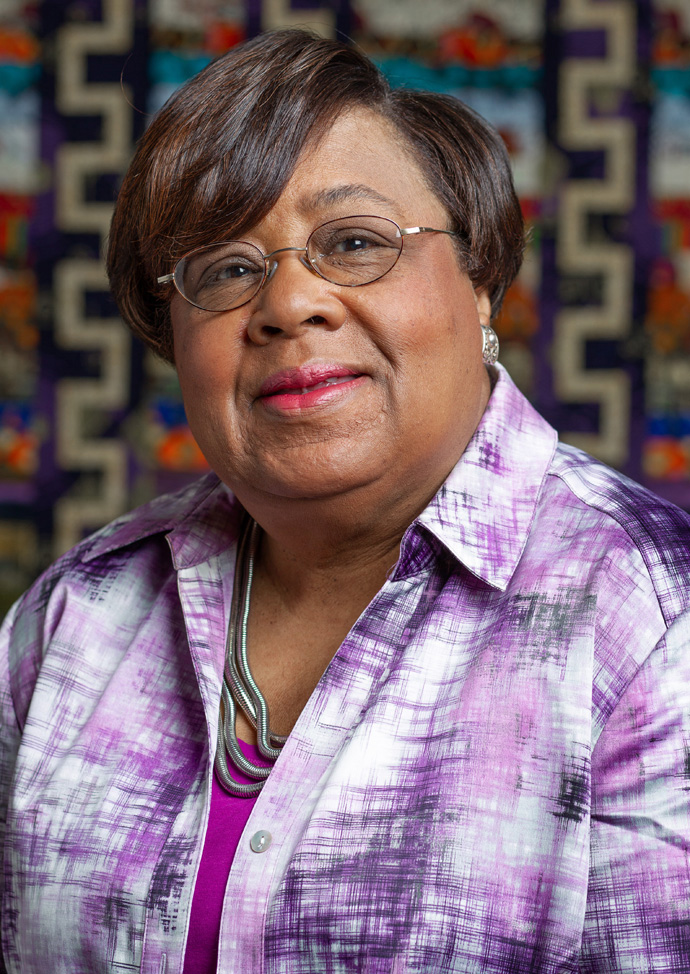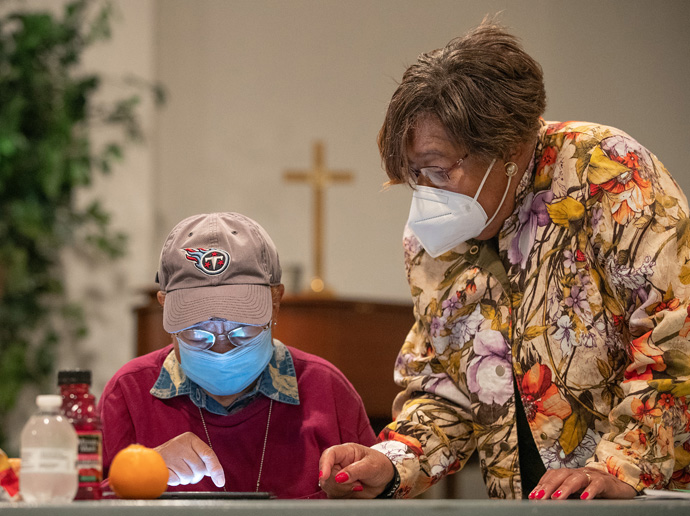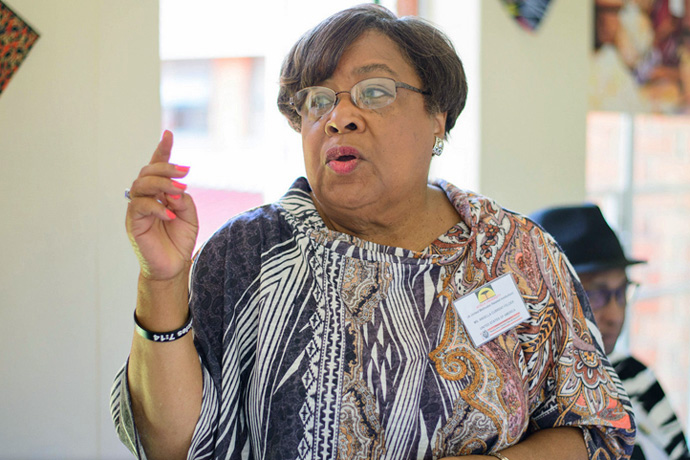
Key Points:
- When Angella Patricia Current-Felder was born, her father suggested naming her after the American abolitionist. Her mother insisted on Angella Patricia. “That started me on my path,” she said. “I have been trying to be Sojourner Truth all my life.”
- As a student at Morgan State University, Current-Felder and another Black woman debated two white men in a tournament. When the men complained about debating the women, Current-Felder and her partner stuck with the topic and won the contest. “I think that really radicalized me,” she said.
- She was recruited to the United Methodist Board of Higher Education and Ministry in 1986 and retired 13 years ago after serving as executive director of the Office of Loans and Scholarships for 25 years. During her tenure, she and a colleague started the Women of Color Scholars Program.
Angella Patricia Current-Felder’s path to a life of advocacy started on the day she was born.
While the Rev. Leontine Turpeau Current was recovering from childbirth, she heard the nurses discussing her newborn’s name as they read a news article in the Michigan Chronicle.
In the article, her father, the Rev. Gloster B. Current, then director of the National Association for the Advancement of Colored People in Detroit, was quoted as saying his daughter would be named Sojourner Truth.
“Mama said, ‘Oh no, that is not going to be her name. It is going to be Angella Patricia after my sister.’ But the nurse insisted, ‘It says right here in the paper it’s going to be Sojourner Truth.’”
Chuckling, Angella Current-Felder said, “That started me on my path; I have been trying to be Sojourner Truth all my life.”
Current-Felder has stayed true to the path on which her parents set her. She was recruited to the United Methodist Board of Higher Education and Ministry in 1986 and retired 13 years ago after serving as executive director of the Office of Loans and Scholarships for 25 years.
During her tenure, she and the Rev. Kathy Sage, also on the Higher Education and Ministry staff, started the Women of Color Scholars Program. It was renamed the Angella P. Current-Felder Women of Scholars Program in 2020 in recognition of her history of promoting scholars of color.
The African American Methodist Heritage Center nominated her for the honor.
On a recent rainy November day, Current-Felder talked about just returning from the celebration of the 35th anniversary of the program, which has graduated 55 women of color with doctorate degrees in various areas of religion.
“I believe there were 35 to 40 graduates there, and to hear how they are now on faculties, producing all kinds of fascinating work, some have written books … all I could do was cry,” she said.
With excitement, Current-Felder said, “We have our first university president. The Rev. Yar Donlah Gonway-Gono is president of the United Methodist University of Liberia. We have our first, and there shall be others.”

Current-Felder knows about “firsts.”
Her mother was the first African American woman elected bishop in The United Methodist Church in 1984.
“We used to say she was always preaching at home and preaching in the classroom,” Current-Felder said. Her mother was a schoolteacher before hearing her call to ministry. Being able to attend her mother’s consecration was a great joy, she said. Her mother died in 2012.
Her father, also a United Methodist pastor, was the national director of Branches and Field Administration of the NAACP during the Civil Rights Movement. In his obituary by The New York Times, her father was said to be the last person to speak with Medgar Evers before Evers was assassinated in 1963.
Current-Felder said that after her parents’ divorce, her mother married another United Methodist pastor, the Rev. James David Kelly. She has three siblings: Gloster Bryan Current Jr., the Rev. John David Current and Pamela Lynn Kelly.
Current-Felder moved around a lot as a child because of her parents’ work. She was born in Detroit, but she spent her elementary school years in Jamaica, a neighborhood in Queens, New York; middle school in Cincinnati; junior high school in Knoxville, Tennessee; and high school in Richmond, Virginia, after her mother married Kelly.
She is a proud graduate of Morgan State University in Baltimore.
As a student, she experienced some life-changing moments.
The first was while she was on the debate team and traveled to Canada to participate in an international debate tournament. Morgan State and Howard University were the only two Black schools represented at the tournament.
Author and AU supporter
Angella Current-Felder is the author of two books. “Breaking Barriers: An African American Family and the Methodist Story” was published by Abingdon Press, 2001. The book recounts the story of her mother, Leontine Current Kelly, who was elected a bishop in The United Methodist Church. She was the first African American woman to become a bishop within a major American religious denomination.
Her second book, “The School of Dreams in the Valley of Hope: The Africa University Story,” was published by Africa University Press, 2012. This book grew from her passion for Africa University, which was founded during her tenure at the United Methodist Board of Higher Education and Ministry. The private university celebrated its 30th anniversary in 2022.
Current-Felder and her partner were set to debate two white men from Williams College in Williamston, Massachusetts. The theme chosen for them to debate was: Should England join the European Market? The two women had the affirmative argument.
“I think I went first and presented my side of the debate,” she said. “When the first man came up, he proceeded to talk about how it was an insult to Williams College to have to participate in a debate with ‘these two Negro girls from Morgan State.’”
Then her partner got up and continued to debate on the theme chosen for them.
“When the other guy got up, he proceeded to continue to talk about how this was a disgrace and insult to their university that they should have to be subjected to being in the same room and the same debate with these Negro girls from Morgan College,” she said.
The white professor, who was the judge, said the win for this round “goes to the Negro girls from Morgan State.”
When the two guys protested, the judge told them, “They debated the topic. What you were talking about is not a matter for this discussion.”
“I think that really radicalized me,” Current-Felder said.
When the students returned to the campus after the debate, they found the student body was picketing a shopping center across from the campus. The shopping center would allow Black people to shop there, but they could not try on clothes. Black people were not permitted to go to the movie theater in the shopping center.
“I changed my clothes and called my dad and told him I was joining the picket line,” she said. Laughing, she recalls him saying, “Don’t you dare get arrested!”
She joined about 100 other students who were arrested and taken to the county jail. They spent the night in jail and were taken to court the next day. The students had picketed the shopping center for several days and up to that point, they had been released.
Subscribe to our
e-newsletter
But on this day, the judge was angry, Current-Felder said.
“I am sick and tired of you (racist slur),” he said. “I told y’all to stop, and since you won’t stop, I’m locking you up.”
“So, then we went to ‘real jail,’” Current-Felder said. The men went to the men’s prison, and the women went to the women’s prison.
As they arrived, Current-Felder recalled, “the women were all standing up around the cells, and they all applauded when we came in.”
They had to strip, shower with lye soap and put on jail uniforms, she said. Because of the large number of students, they had to be three or four in a cell, and some were put into the chapel that also had cell doors.
They were held for three days while the NAACP was negotiating their release. Bail was set at $150 each, and bail money was raised.
“When we got back to campus, Martin D. Jenkins, then head of the college, had arranged a huge banquet for all of us,” Current-Felder said.
In 2015, the students who participated in the protest received honorary doctorates from Morgan State University for their roles as civil rights pioneers. After six days of demonstrations in 1963, the Northwood Shopping Center and the Northwood Theater desegregated.

Another defining moment for Current-Felder came after the Voting Rights Act passed in 1965. She volunteered to go into rural South Carolina to tell Black people they could register to vote. They went out in teams of three. Current-Felder, another white student and a white professor teamed together.
“I remember this brother, a huge Black man dressed in overalls, with fear in his eyes, told us ‘No, sir, I don’t need to vote.’ We kept telling him it was OK, but he just said, ‘I don’t need to vote.’
“It was the first time I had witnessed the fear … from stories I had heard about the hangings and lynching of Black men in the South.
“Then we went to another shack, and there was a woman lying on a bed of newspapers. I had never seen that level of poverty,” she said.
After hearing she could register to vote, the woman said she would go if someone could pick her up and take her. They promised to arrange for that to happen.
“Those two experiences really had a big impact on me,” Current-Felder said.
After graduating from Morgan State, she worked in community relations with the Philadelphia police. From there, she went to Washington as director of the family life center at Shiloh Baptist Church. She also served as the urban leader of the Northern Georgia Urban League and as director of Delta Sigma Theta Sorority Inc.
While she was working at Shiloh, she went to a conference for children held in Nashville, Tennessee.
“I met Lina McCord, head of the Black College Fund, who suggested I look at the General Board of Higher Education and Ministry because the head of the loans and scholarships had just retired,” she said.
She didn’t apply, but she got a call from the office of the Rev. Thomas Trotter who was then executive director of the board, asking her to come to Nashville to interview for the job. She was one of five applicants.
“When Lina drove me to the airport, she said, ‘I don’t know what they are going to do, but you blew everybody else out of the water. You better get ready to come to Nashville.’
“It was clearly divinely guided.” Current-Felder said. She accepted the offer from Trotter and came to Nashville at Thanksgiving in 1986.
In 2001, Current married the Rev. Robert Felder, “after he pursued me royally,” she said, laughing. “I always said I would never marry a preacher, but I did.” Felder died in 2006.
Gilbert is a freelance writer in Nashville, Tenn. News media contact: Julie Dwyer at (615) 742-5470 or newsdesk@umnews.org. To read more United Methodist news, subscribe to the free Daily or Weekly Digests.



